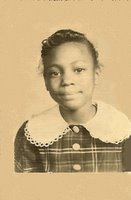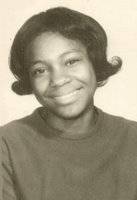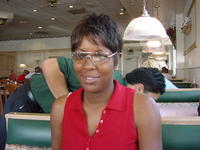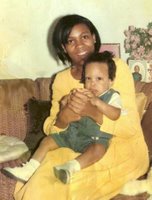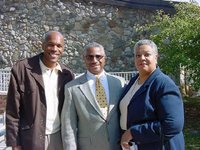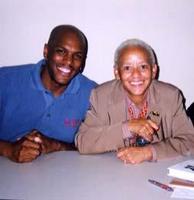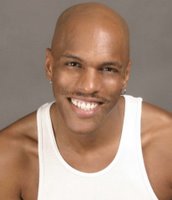|
Unpacking BaggageJust going through my luggage, clearing out some things to make way for enlightenment Monday, July 24, 2006I Know White People... or at least I thought I did*Before I begin this long ass post, I want to take the time to thank everyone who attempted to reach out to me in New York. Bloopty, Terrence and especially Ty, who went as far to plan an event that I was unable to attend, due to some rather unfortunate circumstances. Please accept my apology for what must appear to be blatant rudeness. In 1903, social reformer and activist, W. E. B. Dubois wrote, “The problem of the twentieth century is the problem of the color-line -- the relation of the darker to the lighter races of men in Asia and Africa, in America and the islands of the sea. It was a phase of this problem that caused the Civil War.” He was astute in his observation and could have used the same quotation to make a prediction about the twenty-first century. Race continues to be an issue. Last weekend I finished writing a new short story on the way to my anthology. It chronicles the professional and personal life of a black woman, employed as a domestic for a white family. The characters and plot are based on the Great Aunts and their experiences. I’m excited to have finally incorporated them into a story to showcase the ingenuity and savvy it took to maintain two households; one white and one black. Simultaneously, I’ve finally been able to start reading Post Traumatic Slave Syndrome by Dr. Joy DeGruy Leary. Her work is showing me that nearly 150 years after its abolition, slavery continues to impact my life and those of others, Black and white. She is giving me a History, Sociology and Anthropology lesson; providing me with an increased understanding of my connection to Africa, by highlighting the rituals and traditions that Africans in America have maintained through "180 years of the middle passage, 246 years of slavery, rape and abuse and 100 years of illusory freedom." As with any condition, healing begins with acknowledgement. I’m also gaining greater insight into racism. What is most fascinating is that it’s impossible for Black people to be racist toward white people. Dr. Leary writes, “while Black people have many have prejudices, and at times even feel hatred towards white people, perhaps even causing many fear, the reality is that Black people lack the ‘power’ to affect the lives of white people as a group. Black people’s feelings towards white people do not preclude a white person’s ability to get a loan, receive fair treatment by the justice system, acquire education, etc” Post Traumatic Slave Syndrome has impacted my writing to help me better interpret the interactions between my Black characters and their white employers. I can portray the code switch in communication that occurred from the Black to white households. I can illustrate the rich, complex relationships these women had with white children in their care. It’s been an amazing process during which I have been forced to recognize that I don’t know white people like I thought I did. It becomes increasingly clear that my perception of white people has been shaped more by the interactions of others in my life, than by my own. Family members taught me early to be courteous to white people, engage them, and show myself to be a good Negro, but never, ever trust them. Of course these admonitions came from my grandmother and great aunts who grew up in the depression-era south. For them, white people and black people should co-exist, but each in their own place. By the time I entered kindergarten, I was already friendly with two white boys in the neighborhood, both named Tommy. Although our activities did not differ from those I shared with Black kids, I recognized our differences. They could do things that I couldn’t and, even at five years of age, I surmised it was because they were white. Thus began my disdain for race and the reliance on color to define people. Perhaps the most interesting thing about my childhood understanding of race was that I was very aware of ethnicity and culture. In error used them, with color, as indicators. One Tommy was Irish and the other Italian, which meant vast differences in the home life of each. Yet each shared similarities and what was even more revealing was that I could find in my home similarities to theirs. I was aware that, even with our differences, there was a sameness that transcended color. By the time I reached high school I was very well liked by a whole heap of white folks. I even adopted a couple of families (one Italian and one semi Jewish). At one point I was spending more time at their homes than my own. I was accepted by one because I “wasn’t like most other black people (poor and angry)” and the other because I was (talented and gifted). I believe both kept me around, in part, for comfort and to illustrate a commitment to diversity. I was a “credit to my race,” which meant perhaps there was hope for the rest, but I don’t believe that inviting the most assimilated Negro into your home is a great show of diversity. And I was absolutely assimilated, from my Levi corduroys to my collection of Billy Joel CDs. What do you learn from someone whose practices are so similar to your own? A better display of diversity would be to invite a crack head. Truly amaze the community. I can hear the neighbors now. "Honey, have you met the nice crack fiend that’s been staying with the Nelson’s?” "Yes, dear I have, such a polite young man. He came over to borrow the VCR. The Nelson’s misplaced theirs." I’m sure that both my white families believed having a black person around would disassociate them from racism. Still, I am most grateful for these interactions because they reinforced my belief that I can’t group all white people together any more than I could all Blacks. Both can lay claim to identifiable subgroups that defy association, despite their shared color. Imagine PETA, the NRA and the KKK on one side and the Crips, the NAACP and New Edition on the other. I recognize the absurdity, but you get my point. I will always keep some white people around for insight, growth and access. If they were to pack up and move tomorrow, I would find someway to go along. They possess the power and most of the money. I want some too. My most rewarding white people experiences that, helped shaped my “develop your white people” model occurred in college. Having attended an institution that was predominately white, in the city of Boston, which is painfully white, I had to learn to survive and thrive in a world where people just didn’t look like me very often. Of all the people I met and befriended, I learned the most from Lisa. She grew up in Queens with her crazy Italian family. We would talk honestly about discrimination and prejudice. She has an uncle and aunt that moved to New Hampshire to get away from Black people. I absolutely loved that she wasn’t afraid to challenge them for their beliefs. She talked about having heard the N word spoken openly in her home. I could relate because they used it at my house too. Of course the connotation was different. Lisa gave me access to a white person that didn’t use skin color as a factor for determining the worth of an individual. She’s not the first, and hopefully not the last to do it, but she has most affected me. She’s a credit to the race. After the Boston experience I was just a little over white people and immersed myself in everything Black and my interactions with white folks became more formal. I no longer felt the need to prove that I was okay. Instead I chose to get in where I fit in and realized that getting in does not necessarily preclude fitting in. We might look alike, but there is a vast difference between colored folks in the ‘hood and the old guard. I fall somewhere in between. Here is one way to illustrate. If Massa George and Miz Laura were picking out house servants and field hands, I would be chosen for domestic service, but I still would not have the access of Condie. She’s the Head House Negress in Charge (HHNIC). In the recent past, I had the opportunity to work with two dynamic women, who happen to be white. I also worked with two of the dimmest women, who happen to be Black. I love my white women, who I will call Jill and Lauren (Isn’t that typical?). They are amazing, supportive and caring. Our relationship is based on respect and mutual admiration and that’s important, regardless of race, ethnicity or gender. I trust them. The two black women, Latasia and Boomshiqua, can’t stand me and, at one time or another, tried to sabotage my career. I miss my white women, but I fully intend to dance at Jill’s wedding next year and spend a grip on her gift because she deserves it. When Lauren gets married, I will do the same. I’ve learned to accept the concept of white privilege and the institution of racism and not blame individuals for a collective consciousness or perhaps, unconsciousness. Dr. Leary has helped me realize that most, if not all of the commonly held beliefs about race are based on archaic theories and practices that were perpetuated to reinforce the supposition of the inferiority of the enslaved, thereby justifying the institution of slavery. The practices outlined in her book are barbaric and inhumane. A chapter that examines crimes against humanity is particularly graphic and disturbing. While it is very difficult to read and evokes anger and outrage, I know that I can’t direct that rage at the white people with whom I come in contact daily. If all this is news to me, it’s news to them. U.S. History classes have not been very forthcoming in their accounts of the slave trade, anymore than to acknowledge that slaves fought for the Union Army. The truth is this country is not comfortable with confronting its ugly past or acknowledging its sin. Yet shall it continue to expose the terrorist acts of others, which pale in comparison to the atrocities perpetuated upon the indigenous peoples of the Americas and the African people taken from their land to cultivate one to which they could lay no claim, all in the name of God. In order to maintain any degree of sanity I must believe that the average white citizen really isn’t aware of the brutality this great country heaped upon a portion of its populace. The portion that is responsible for putting in place many of the comforts we enjoy today. I question why a talented and smart people are poor and angry. Grief can drive someone to anger and be clear African Americans are grieving. Perhaps not all of us express it in the same way, but imagine a wound left untreated. It gets infected and spreads poison throughout the body, eventually killing the wounded. To illustrate further, I’ve had discussions with people, white and black, which say that slavery happened so long ago and we should forget it and move on. On the vast continuum 150 years is not so long ago. Imagine learning your spouse and children have been violently murdered and five years later I say, “That was so long ago. You should forget it and move on.” Would you not be angry and hurt? What if everyone pretended your family never existed? There are potentially dangerous consequences when severe trauma is left untreated. I firmly believe we must move on… by remembering. Along with so many others, black and white, I stand on the backs of slaves. Some of us have the precious gift of names for some of them. For so many others that information is forever lost. In the nation’s capitol we have galleries and museums that honor the contributions of pretty much everyone. There is even a spy museum. Just like there is a Holocaust museum to preserve that moment in history, there should be a Museum of the American Slave. The exhibition should be factual and void of any dramatic effect. The truth told plainly will be quite enough. Black and white, we are all traumatized and we need to heal together. When I get to that point in the book, I will share some thoughts. Meanwhile, you can get your own copy and start healing. Knowledge is power and we must have a clear picture of where we’ve been to chart a clear path to the future. |
|

















